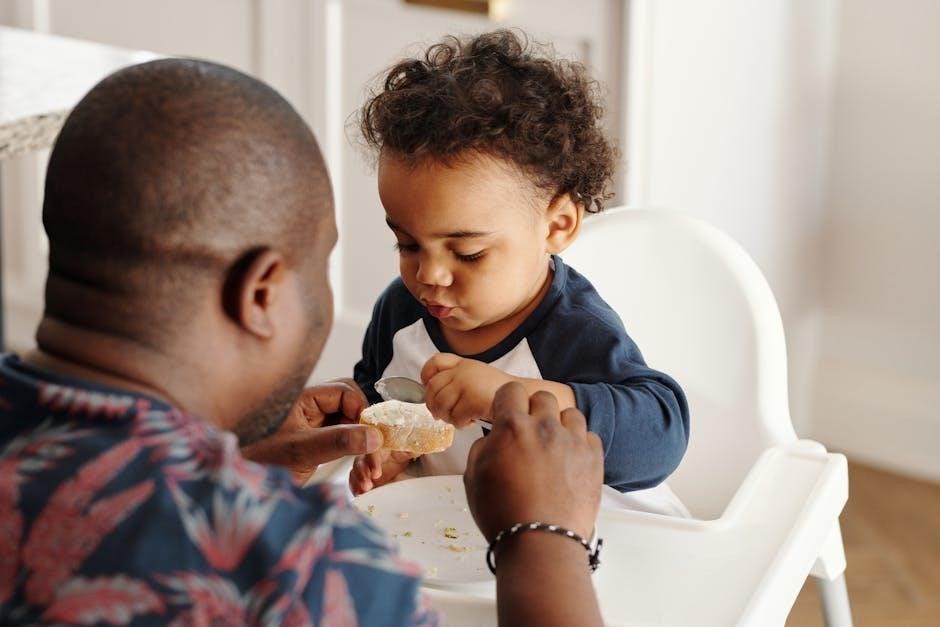
the hangover parents guide
Welcome to the ultimate guide for parents navigating the unpredictable world of parenting hangovers. Discover practical strategies to manage exhaustion, maintain balance, and thrive despite challenges.
1.1 Understanding the Concept of a Parenting Hangover
A parenting hangover refers to the physical and emotional exhaustion many parents experience due to the demands of raising children. It often results from lack of sleep, constant multitasking, and the stress of meeting a child’s needs. This concept highlights the challenges of balancing personal well-being with parenting responsibilities, emphasizing the need for practical strategies to recover and maintain energy for daily tasks. Understanding this phenomenon is the first step toward finding solutions.
1.2 Why Parents Need a Guide to Navigate This Challenge
Parents often face unique challenges that lead to emotional and physical exhaustion, making it difficult to balance work, family, and personal well-being. A guide provides tailored strategies to manage these struggles, offering practical solutions to recover from burnout and maintain energy for parenting. By addressing time management, self-care, and support systems, a guide helps parents navigate the parenting hangover effectively, ensuring they can thrive while raising their children.
Signs and Symptoms of a Parenting Hangover
Physical and emotional exhaustion, irritability, and a lack of patience are common signs. Recognizing these symptoms helps parents address the root causes and manage challenges effectively.
2.1 Physical and Emotional Exhaustion in Parents
Physical exhaustion manifests as fatigue and decreased energy, while emotional exhaustion leads to irritability and reduced patience. These symptoms often stem from lack of sleep, stress, and constant caregiving demands. Parents may struggle to keep up with daily routines and find it challenging to connect emotionally with their children. Recognizing these signs is crucial for taking proactive steps toward recovery and maintaining healthy family dynamics.
2.2 How Kids React to a Parent’s Hangover
Children often sense their parent’s discomfort, leading to anxiety or worry; Some kids may become clingy or act out, while others might show concern or embarrassment. Older children may even express frustration or mimic behaviors they observe. It’s essential for parents to address these reactions with honesty and reassurance, ensuring their children feel secure and supported, even when the parent isn’t at their best;

Managing a Hangover with Small Children
Parenting with a hangover requires creativity and patience. Hydrate, eat simple meals, and prioritize rest while maintaining your child’s routine with gentle activities and distractions.
3.1 Strategies for Survival When You Have Kids
Surviving a hangover with kids demands a mix of preparation and flexibility; Keep hydrated, eat bland foods, and plan low-energy activities like movies or puzzles. Delegate tasks if possible and maintain consistent routines to provide stability. Rest when your child naps and use humor to keep things light. Prioritize self-care to recover quickly and avoid overwhelm.
3.2 Practical Tips for Recovering While Parenting
Recovering from a hangover while parenting requires smart strategies. Stay hydrated with water and electrolytes, and eat bland, easily digestible foods like toast or bananas. Rest when your child naps and maintain a consistent routine to provide stability. Use humor to lighten the mood and distract from discomfort. Delegate tasks to a partner or older child if possible. Prioritize self-care and plan ahead to avoid future overwhelm.

Maintaining Work-Life Balance to Prevent Hangovers
Balance work and family life by setting clear boundaries, prioritizing self-care, and involving partners in parenting duties to reduce stress and prevent burnout.
4.1 Time Management for Busy Parents
Effective time management is crucial for balancing work and parenting. Create a structured schedule, delegate tasks, and use productivity tools to optimize your day. Prioritize quality time with children while ensuring personal and professional commitments are met. By organizing tasks efficiently, parents can reduce stress and prevent burnout, fostering a healthier work-life balance to avoid parenting hangovers.
4.2 The Importance of Self-Care in Parenting
Self-care is essential for parents to maintain emotional and physical well-being. Simple acts like rest, exercise, and hobbies can recharge energy. By prioritizing self-care, parents reduce stress and improve their ability to care for children effectively. Even small moments of personal time can make a significant difference in managing parenting challenges and preventing hangovers.
Communicating with Children About Alcohol and Hangovers
Open conversations about alcohol and hangovers with your kids foster trust and understanding. Be honest and age-appropriate, emphasizing the importance of responsible choices and health.
5.1 Age-Appropriate Conversations About Alcohol
Engage your children in age-appropriate discussions about alcohol to help them understand its effects and risks. For younger kids, explain that alcohol is only for adults and can harm their growing bodies. As they grow older, discuss peer pressure and responsible choices. Foster trust by encouraging questions and providing honest answers. This approach helps build a foundation for healthy attitudes toward alcohol and supports informed decision-making in the future.
5.2 Teaching Kids About Responsibility and Health
Teach your children the importance of responsibility and health by modeling positive behavior and encouraging open discussions. Explain how alcohol can harm their health and impair judgment. Foster a sense of accountability by involving them in self-care routines and decision-making. Positive reinforcement and clear expectations help kids develop healthy habits and a strong sense of responsibility, equipping them to make better choices as they grow.

Dealing with Criticism and Social Pressure
Learn to handle judgments confidently by staying calm and focused on your parenting goals. Set boundaries with others and prioritize your family’s well-being over societal expectations.
6.1 How to Handle Judgments from Others
Dealing with criticism can be challenging, but staying calm and composed is key. Avoid over-explaining your actions and focus on what works best for your family. Surround yourself with supportive people who understand your parenting challenges. Remember, others’ opinions don’t define your worth as a parent. Practice self-compassion and remind yourself that you’re doing your best. Setting boundaries with critics and prioritizing your family’s well-being helps build resilience against societal pressures.
6.2 Building Confidence as a Parent
Building confidence as a parent starts with self-compassion and recognizing your efforts. Celebrate small victories and acknowledge your progress, even in challenging moments. Focus on fostering a positive relationship with your children, prioritizing their emotional and physical well-being. Confidence grows through consistent, loving actions and learning from experiences. By embracing your unique parenting style and staying true to your values, you create a resilient foundation for both yourself and your family to thrive.

Building a Support System for Parents
A strong support system is essential for managing parenting challenges. Surround yourself with understanding family, friends, and communities to share responsibilities and gain emotional support.
7.1 The Role of Family and Friends in Parenting
Family and friends play a vital role in supporting parents during challenging times. They can offer emotional encouragement, help with daily tasks, and provide much-needed breaks. Surrounding yourself with a network of trusted individuals ensures you never feel isolated. Their assistance can be invaluable, allowing you to recharge and focus on your well-being while managing your parenting responsibilities effectively.
7.2 Joining Parenting Communities for Help
Joining parenting communities provides invaluable support and connection. These groups, whether online or in-person, offer emotional encouragement, practical advice, and shared experiences. They help reduce feelings of isolation and provide a safe space to discuss challenges. Engaging with these communities can lead to lasting friendships and a stronger support network, empowering you to navigate parenting with confidence and resilience. They are a lifeline for many, fostering growth and understanding.

Preventing Future Parenting Hangovers
Preventing future parenting hangovers involves setting boundaries, prioritizing well-being, and planning ahead. A balanced lifestyle and mindful choices can reduce stress and avoid overwhelming situations.
8.1 Setting Boundaries and Priorities
Setting clear boundaries and priorities is essential for preventing parenting hangovers. Establishing limits on commitments and focusing on what truly matters helps reduce stress. Parents can delegate tasks, schedule downtime, and communicate openly with family members. By prioritizing self-care and balancing responsibilities, parents create a healthier lifestyle that minimizes overwhelm and fosters long-term well-being, making future hangovers less likely.
8.2 Healthy Alternatives to Alcohol for Stress Relief
Exploring healthy alternatives to alcohol is key for managing stress without the risk of a hangover. Activities like exercise, meditation, or hobbies can provide relief. Staying hydrated, eating nutritious meals, and ensuring adequate sleep also help. Engaging in creative outlets or spending time with loved ones can reduce stress naturally. These methods not only prevent hangovers but also promote overall well-being, benefiting both parents and children.
Parenting is a journey filled with challenges and rewards. By embracing strategies for balance, self-care, and support, parents can navigate hangovers and thrive, ensuring a healthier, happier family life.
9.1 Recap of Key Strategies for Parenting Success
Effective parenting requires balancing responsibilities, prioritizing self-care, and fostering open communication. Strategies like time management, setting boundaries, and seeking support can help parents overcome challenges. Teaching children responsibility and health awareness is crucial. Building a strong support system and engaging in communities enhances resilience. By adopting these practices, parents can navigate hangovers and create a nurturing environment for their families to flourish.
9.2 Encouragement for Parents to Thrive
Parenting is a journey of growth and resilience. Embrace challenges as opportunities to learn and strengthen your bond with your children. Remember, it’s okay to ask for help and prioritize your well-being. Celebrate small victories and cherish moments of joy. With patience and love, you can overcome any obstacle and create a fulfilling life for your family. Keep going—you’re making a difference every day!